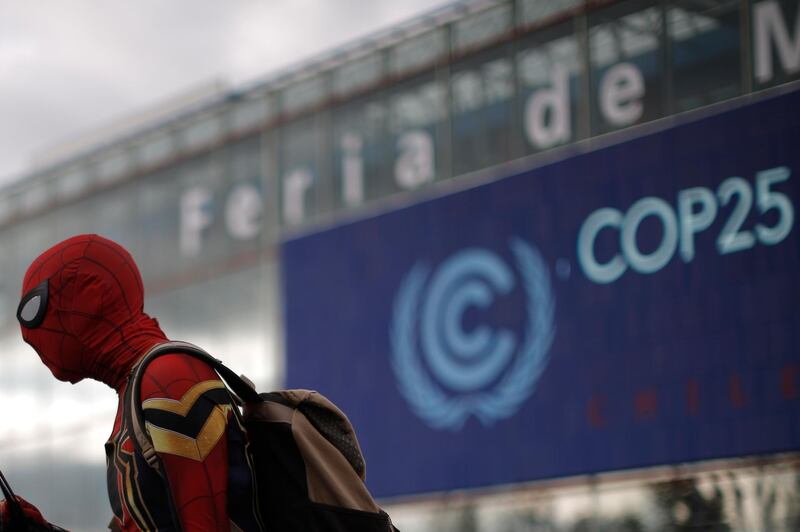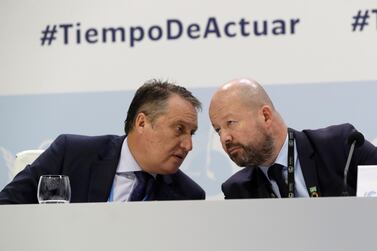California, Australia and the Amazon have literally been on fire in recent months, and Venice underwater. Climate change campaigners such as Sweden’s Greta Thunberg have galvanised a growing shift in world public opinion. Yet last week’s United Nations Framework Convention on Climate Change (COP25) negotiations in Madrid faced the usual deadlock, late-night negotiations, and lack of sufficient and believable commitment from the assembled nations.
COP25 was intended to advance important issues from the 2015 Paris Agreement. On the agenda are a global carbon market, and compensation payments by the developed countries for past climate damage. Next November, at COP26 in the Scottish city of Glasgow, nations will meet again, this time to submit new, more ambitious and binding climate plans.
The countries that are suffering from fire and flood refuse to even take the problem seriously. The US, which will exit the Paris Agreement in November 2020, the day after the presidential election, still thinks it is entitled to behave disruptively and frustrate other nations' attempts to reach an agreement. Costa Rica, Brazil and Australia blamed the US for preventing a deal. Meanwhile China, India and Japan have been unwilling to raise their ambitions next year.
The EU has pledged to be carbon-neutral by 2050, a good commitment but which seems far enough not to be urgent. It did not agree on an intermediate target of cutting emissions 55 per cent by 2030, just a decade away and which would require major policy changes.
International cooperation is currently struggling on many fronts. Even on trade, in principle a win-win for all, countries are retreating from global approaches and opting for withdrawal, self-harming disputes, or at best grudging, limited and transactional deals. Exactly 27 years after the Rio Summit that birthed the Kyoto Protocol, it’s evident that multilateral climate diplomacy, though important, is not going to deliver a grand bargain big and fast enough to halt climate catastrophe.
But this is not a counsel of despair. We have made major progress over the past decade in assembling the toolkit for tackling climate change. Low-carbon technologies have advanced to the point of being serious competitors to their fossil-fuelled alternatives.
Solar and wind are the cheapest sources of new electricity in many places, including the Middle East, Australia, south-western US and north-east Europe. Audi, BMW, Tesla, Mercedes, Volkswagen and other car makers are launching new electric models in 2020. Lithium-ion battery costs keep dropping and battery vehicles might reach cost-parity with petrol and diesel in the mid-2020s. An advanced gas-fired plant that captures all its carbon dioxide emissions is being piloted by NET Power in Texas; Oklo's small modular nuclear reactor is moving ahead in Idaho.
Today's oil business has about $2.2 trillion (Dh8tn) of annual revenues; natural gas about $0.4tn; coal perhaps $0.5tn. The solutions to climate change will create businesses on an even larger scale. On very rough figures, by 2050, electric vehicle sales could be $3tn per year, hydrogen equipment and production an annual $2.5tn, "clean" non-animal meat $1.7tn, direct atmospheric removal of carbon dioxide $1.1tn, carbon capture, use and storage $0.2tn, electricity from wind $0.4tn, solar generation $0.13tn and lithium mining for batteries $0.08tn. There are further trillion-dollar businesses yet to be imagined, let alone created, in clean steel, buildings, plastics, aviation and others.
The dominant emotion should be excitement at such tantalising opportunities, not fear of climate chaos. The challenge is to find the right tools to make these businesses profitable and accelerate their growth. Leading climate policy thinker David Victor, writing in the New York Times, suggested that the focus for COP25 onwards should be on creating decarbonised global industries – such as automobiles or steel – rather than decarbonising within national borders.
EU emissions were 20 per cent of the global total in 1990, have now fallen to 10 per cent and will drop further as other countries’ emissions continue rising. The paradox is that the more successful domestic climate policy in Europe or Japan is, the less it matters in the global balance. Instead, the key becomes the creation and worldwide dissemination of climate-friendly technologies.
This is not necessarily bad news for the Middle East, despite its current dependence on oil and gas rents. Its ability to muster state-directed investment, its abundant solar potential, its natural gas for creating clean hydrogen, its geological reservoirs for storing carbon dioxide, and its central geography in global trade, are all advantages in the new energy world.
As COP25 is derailed by the obstructionists from America and elsewhere, global citizens should not lose hope for environmental salvation. Corporations and nations should worry less about the costs of climate compliance, and more about the costs of non-compliance and missing the future. New industries will not spring up magically. They require innovation, risk-taking investments, engagement with governments and society, and the creation of markets.
Robin Mills is CEO of Qamar Energy, and author of The Myth of the Oil Crisis







